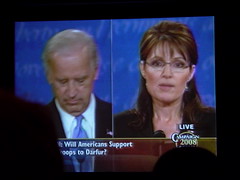The Washington Post is running a story on common misperceptions about how American voters base their decisions on moral values.
The myths: (1)”Moral values” determine who wins elections. (2) Americans have broadly rejected “traditional values.” (3) Americans are polarized and fighting a culture war over values. (4) Traditional values are “family values” or “moral values.” (5) Basic values, properly understood, are compatible and harmonious.
In support of myth #2, the Post draws upon the work of sociologist Wayne Baker. MYTH #2: “Americans have broadly rejected ‘traditional values.’ — Actually, Americans retain our traditional values more than just about any other developed country in the world.”
That’s what University of Michigan sociologist Wayne Baker found in his 2005 book, “America’s Crisis of Values: Reality and Perception.” Baker uses the World Values Surveys to look at American values from a broad, global perspective. He describes human values on two planes. The first is a scale of values from traditional to secular-rationalist. Societies with more traditional values emphasize the importance of God and religion, family and parenting, national identity and pride and absolute standards of morality, not relative ones. Secular-rationalist values are pretty much the opposite: nonreligious, open to abortion and euthanasia, skeptical of national pride or patriotism and evolving away from family, duty and authority.
The second range of values runs from survival values to self-expression ones. In less developed and safe societies, survival values reign. Procuring physical security and meeting basic material needs dominate; foreigners and ethnic diversity are seen as threatening; intolerance is exaggerated. Self-expression values concern creativity, self-fulfillment and lifestyle.
Fascinating. Read more about the other myths here.

 Mother Jones
Mother Jones




